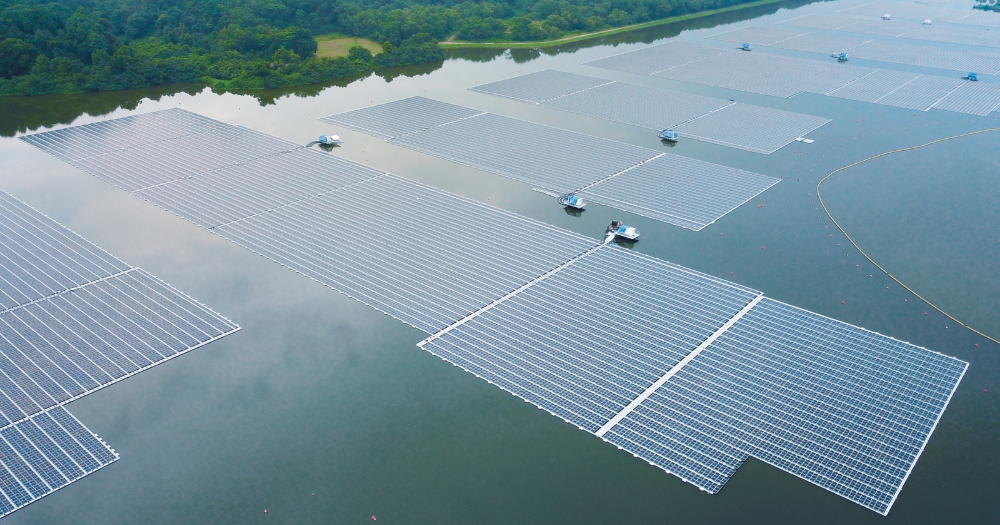Follow us on Telegram for the latest updates: https://t.me/mothershipsg
Singapore's first large-scale floating solar farm at Tengeh Reservoir is now in full operation.
The solar farm was officially opened by Sembcorp Floating Solar Singapore, a Sembcorp Industries' (Sembcorp) subsidiary, and the national water agency PUB on July 14.
The launch was officiated by Prime Minister Lee Hsien Loong and was attended by the Minister for Sustainability and the Environment Grace Fu.
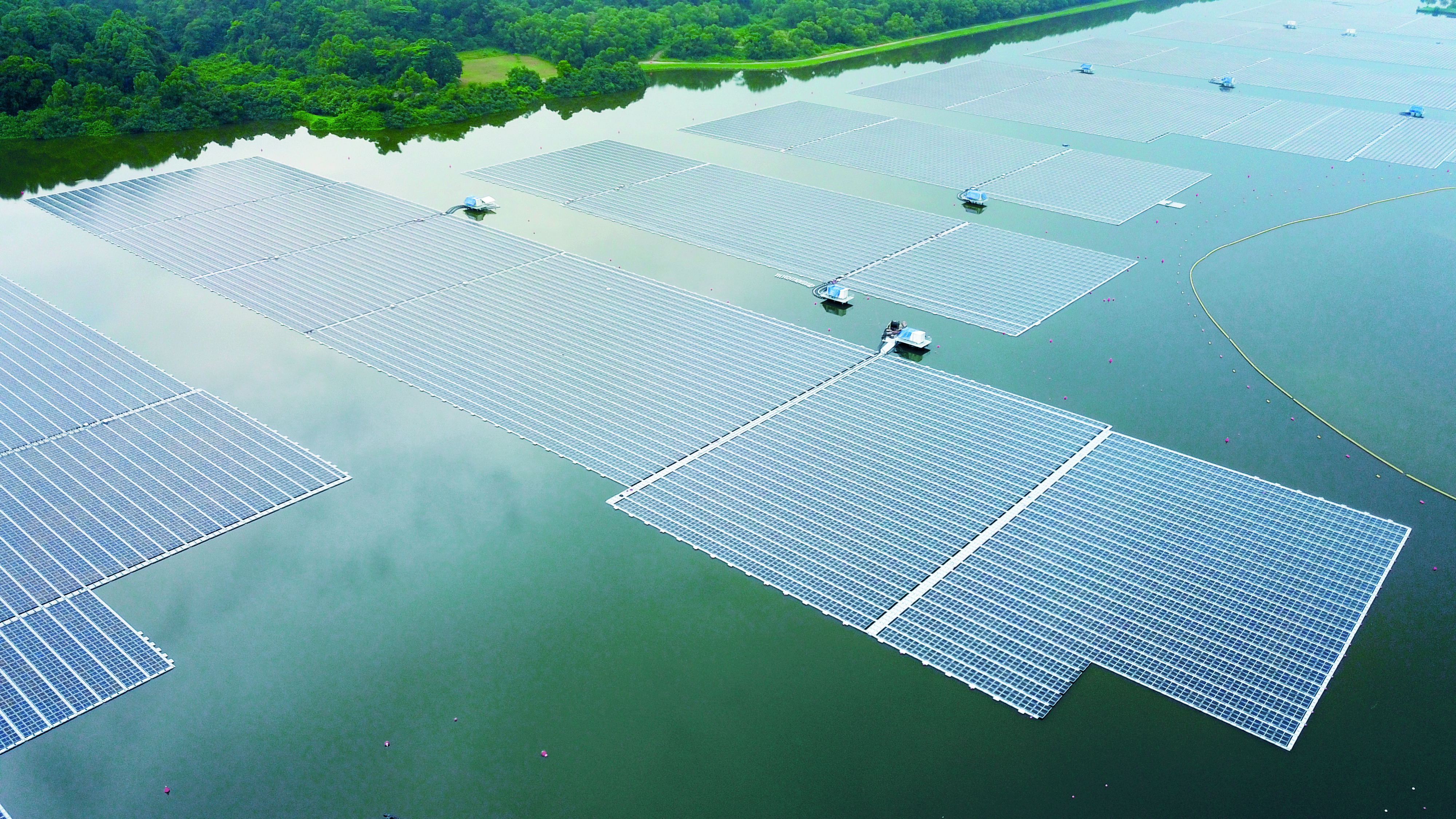 Aerial View of the Sembcorp Tengeh Floating Solar Farm. Photo courtesy of Sembcorp Industries.
Aerial View of the Sembcorp Tengeh Floating Solar Farm. Photo courtesy of Sembcorp Industries.
First large-scale floating solar farm in Singapore
Spanning an area of 45 hectares, or about 45 football fields, the Sembcorp Tengeh Floating Solar Farm is the first large-scale floating solar farm in Singapore.
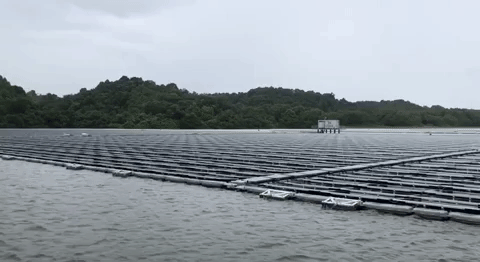 Video by Fiona Tan.
Video by Fiona Tan.
Here's a bird's-eye view of the solar farm:
 Video courtesy of Sembcorp Industries.
Video courtesy of Sembcorp Industries.
With 10 solar panel islands, and 16 power conditioning systems which converts direct current to alternating current, the entire floating solar farm occupies one-third of Tengeh Reservoir.
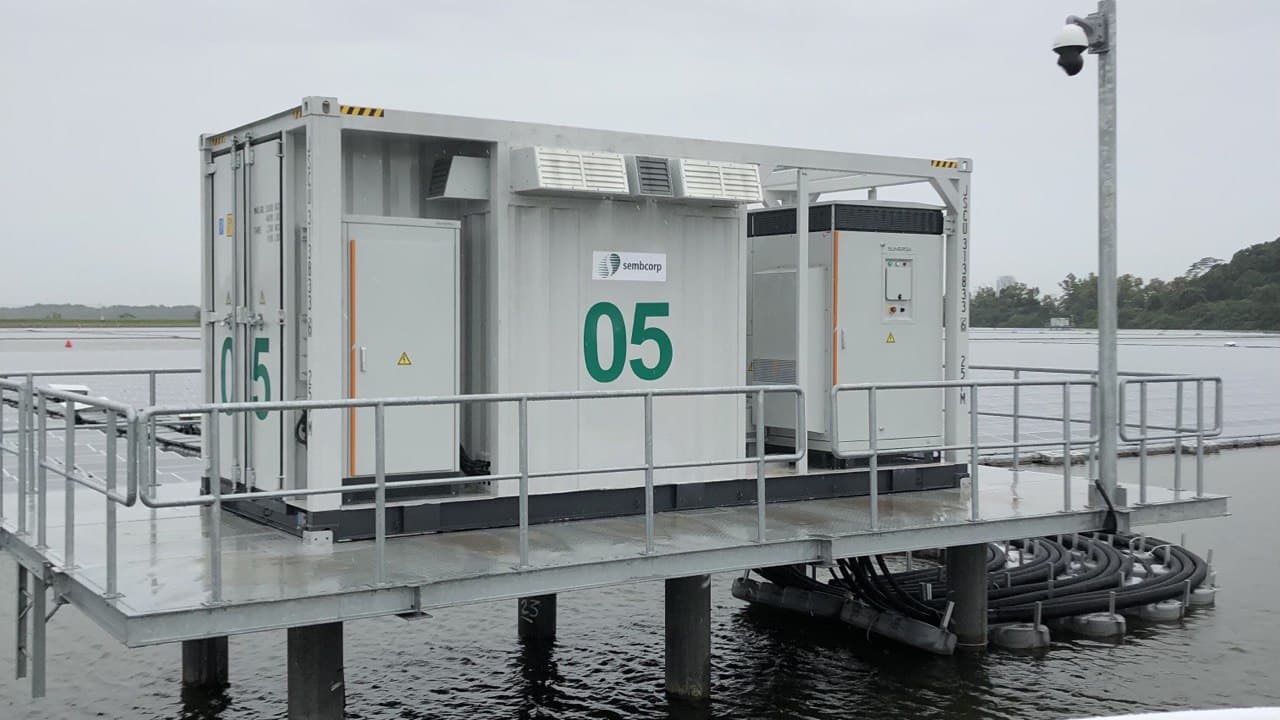 One of the ten Power Conditioning Systems. Photo by Fiona Tan.
One of the ten Power Conditioning Systems. Photo by Fiona Tan.
It is also one of the world’s largest inland floating solar photovoltaic (PV) systems, according to Sembcorp and PUB.
100 per cent green waterworks system in Singapore
The Sembcorp Tengeh Floating Solar Farm has started operating since last month, prior to today's official opening.
The amount of electricity generated from 122,000 solar panels at the floating solar farm is equivalent to the amount needed to power 16,000 4-room HDB households.
The floating solar farm serves to power all five local water treatment plants on mainland. These water treatment plants produce potable water for Singapore.
With the solar farm powering our water treatment plants, Singapore is one of the few countries with a 100 per cent green waterworks system.
According to Sembcorp and PUB, the floating solar farm will reduce carbon emissions by about 32 kilotonnes annually, or the equivalent of 7,000 fewer cars on the roads.
This will offset about seven per cent of PUB's annual energy needs, the joint media release stated.
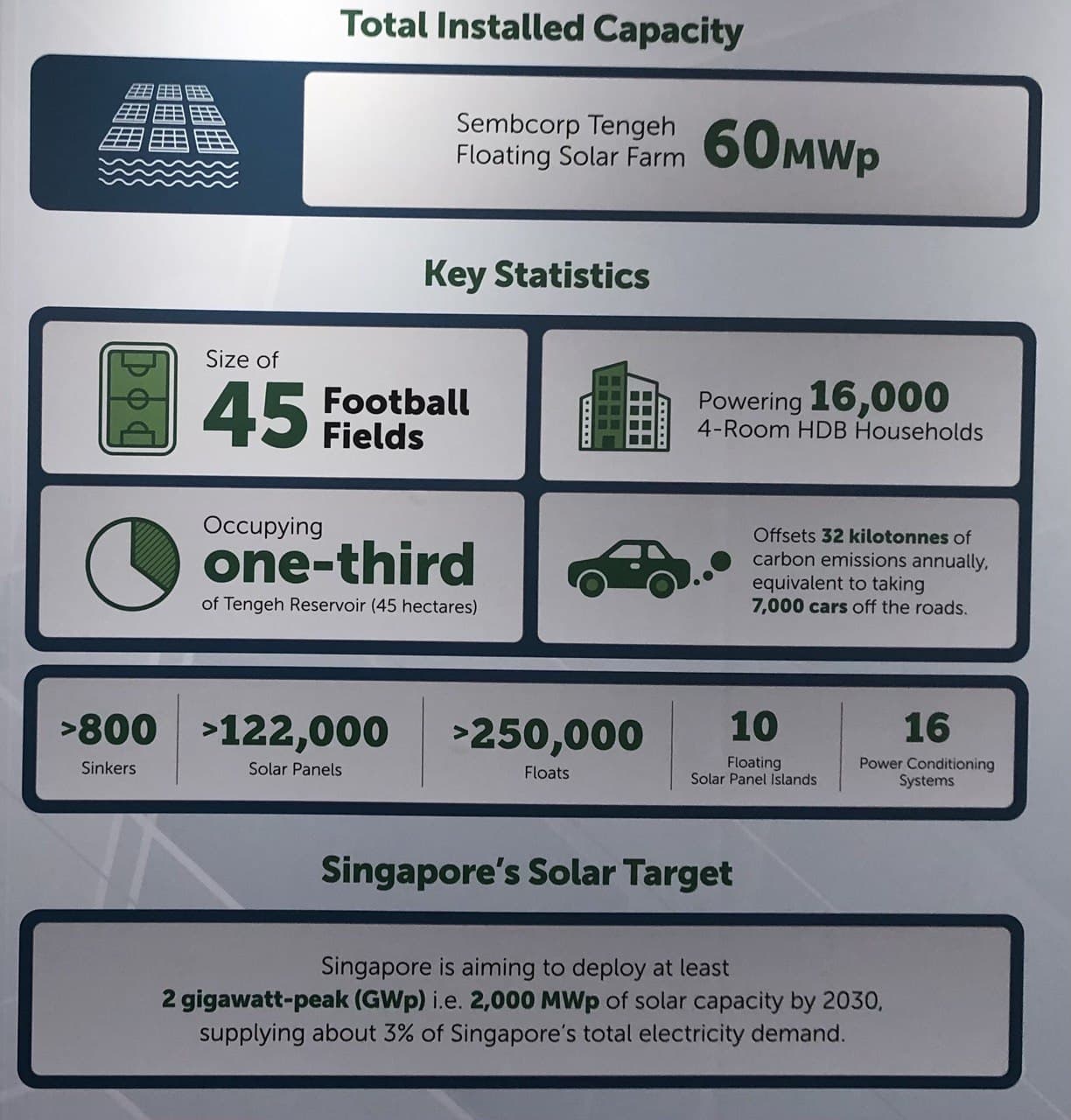 Photo by Fiona Tan.
Photo by Fiona Tan.
Designed to last and take into consideration of wildlife
Sembcorp's Head of Integrated Solutions for Singapore and Southeast Asia, Jen Tan, said the solar panels at Tengeh reservoir has gone through "extreme testing".
The panels are fitted with "advanced technology", like a double glass panel to stave off degradation, and are expected to last for 25 years.
In addition, the panels, tilted at a slight angle of three degrees, allow runoff from the rain to wash off any substance found on the surface of the solar panels.
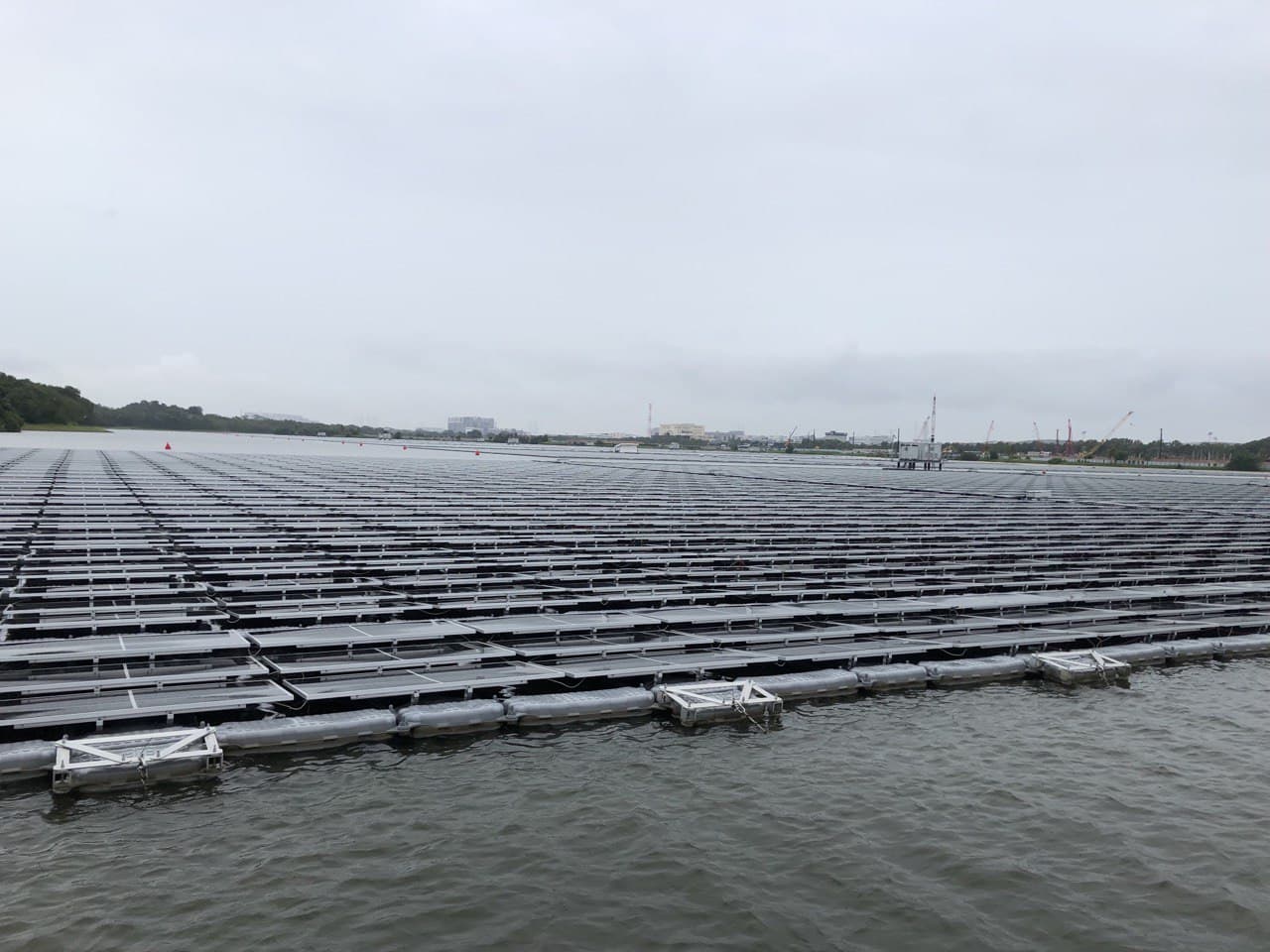 Panels are slightly angled by three degrees. Photo by Fiona Tan.
Panels are slightly angled by three degrees. Photo by Fiona Tan.
More than 250,000 floats used to keep the panels afloat are made of high-density polyethylene – a certified food-grade material that is recyclable, UV-resistant and corrosion resistant.
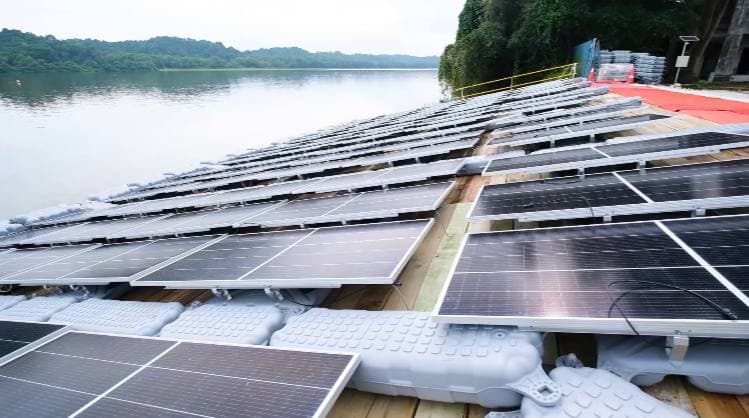 Food-grade floats. Screenshot of video courtesy of Sembcorp Industries.
Food-grade floats. Screenshot of video courtesy of Sembcorp Industries.
According to Sembcorp and PUB, the floating solar farm was designed with the surrounding flora and fauna and water quality in mind.
For instance, the solar panels' surfaces are coated with anti-glare to not disorientate birds.
 The 60MWp Sembcorp Tengeh Floating Solar Farm. Photo courtesy of Sembcorp Industries.
The 60MWp Sembcorp Tengeh Floating Solar Farm. Photo courtesy of Sembcorp Industries.
Islands of solar panels are spaced out with gaps to improve airflow and allow sufficient sunlight to enter the water beneath. Additional aerators were also put in place to maintain the reservoir's oxygen levels.
These are measures implemented after the Environment Impact Study and consultations with nature groups were conducted between 2015 and 2018.
PUB and Sembcorp said they will monitor the reservoir closely, and take necessary measures to maintain biodiversity and water quality.
Four engineers will be onsite at Tengeh Reservoir to ensure the smooth running of the solar farm, Sembcorp's Head of Integrated Solutions for Singapore and Southeast Asia, Jen Tan told media.
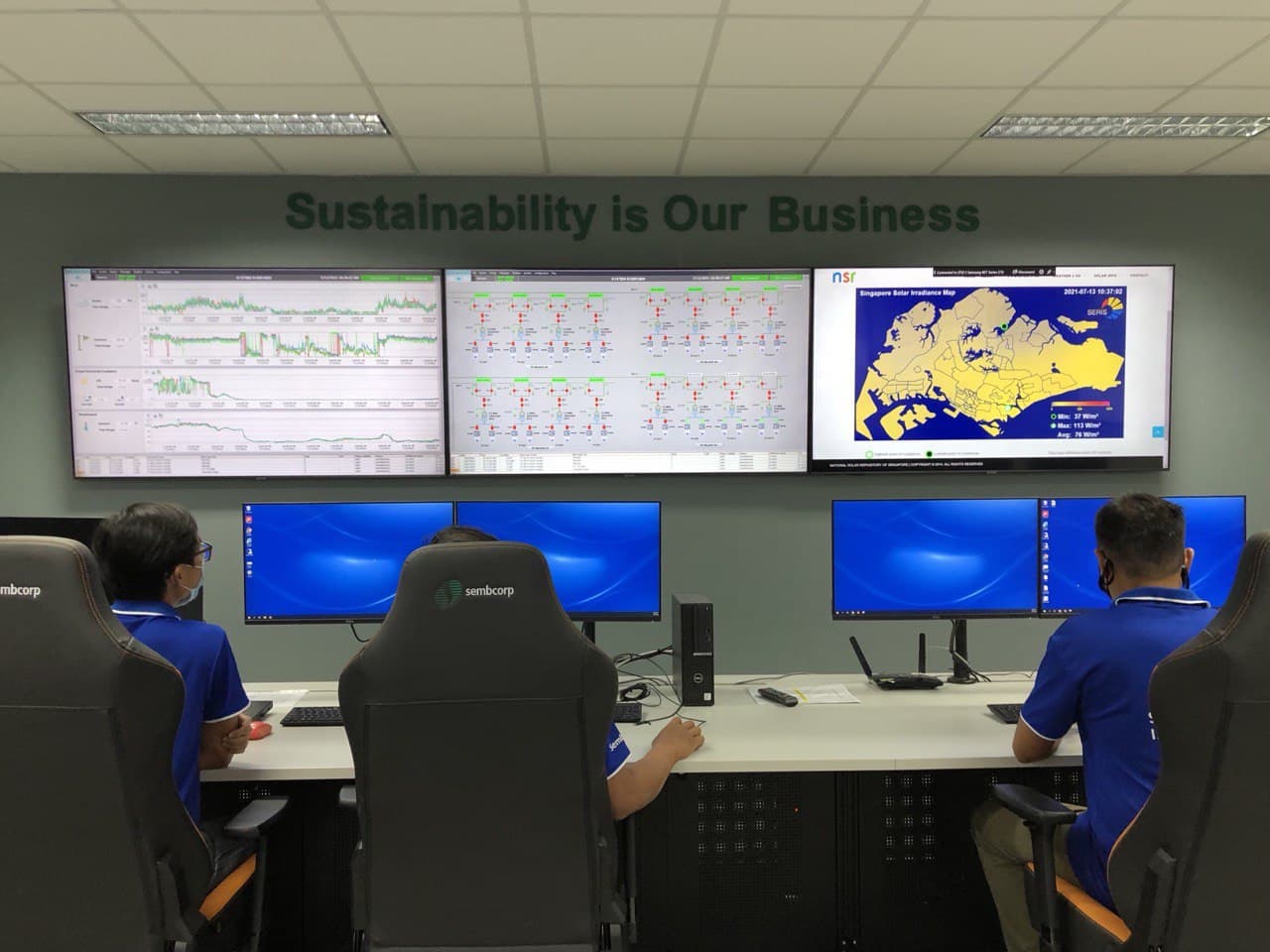 Photo by Fiona Tan.
Photo by Fiona Tan.
In addition, advanced drone electroluminescence imaging technology will be deployed at the floating solar farm, a world's first on a utility-scale PV system.
Drone electroluminescence imaging captures X-ray-like signals from PV modules to accurately and rapidly pinpoint defects.
Drones will also be used to assist with the farm's operation and maintenance by performing "regular and rapid remote visual inspection".
 Prime Minister Lee Hsien Loong and Minister Grace Fu at the Sembcorp Tengeh Floating Solar Farm Control Building. Photo courtesy of Sembcorp Industries.
Prime Minister Lee Hsien Loong and Minister Grace Fu at the Sembcorp Tengeh Floating Solar Farm Control Building. Photo courtesy of Sembcorp Industries.
A blueprint for future large-scale floating solar photovoltaic systems
PUB's Chief Sustainability Officer and Director of Policy and Planning, Chong Mien Ling described the Sembcorp Tengeh Floating Solar Farm project as "an idea 10 years in the making".
Since the ideas was mooted in 2011, the team explored various types of technologies and had various considerations before the construction of the floating solar farm in August 2020.
For example, the world's largest floating solar PV testbed with 10 floating PV systems – "a first-of-its-kind" – was launched in 2016 to compare different PV technologies, designs, and their subsequent performance.
Results from the testbed found that the floating solar panels performed five to 15 per cent better than those mounted on rooftops, due to the cool reservoir environment.
An environment impact study was conducted and findings revealed no observable change in water quality nor significant impact on surrounding wildlife before construction was carried out, according to Sembcorp and PUB.
The team also had to overcome a new set of challenges during the construction phase due to Covid-19 restrictions.
Nevertheless, the project was completed on time and "in less than a year" despite manpower and supply chain constraints.
The team even came up with a new engineering and construction technique using a "custom-built jig" which boost the rate of solar panel assembly by 50 per cent.
The lessons learnt from Sembcorp Tengeh Solar Farm will be applied to the construction of the two other floating solar farms at Lower Seletar Reservoir and Bedok Reservoir, which are expected to be completed by 2021, according to Sembcorp and PUB.
Sembcorp's Group President and Chief Executive Officer, Wong Kim Yin said:
"With the substantial amount of learning, the Sembcorp Tengeh Floating Solar Farm provides a blueprint for the design, construction, operations and maintenance of future large-scale floating solar photovoltaic systems."
Wong also added that the Sembcorp Tengeh Floating Solar Farm is a key project contributing to Singapore's sustainability movement and is a "crown jewel" in Sembcorp's portfolio.
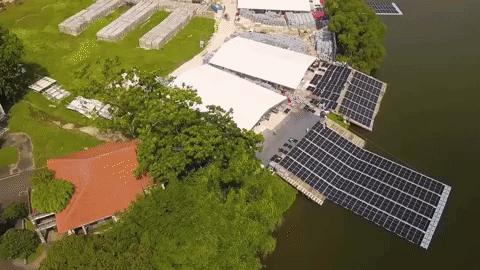 Video courtesy of Sembcorp Industries.
Video courtesy of Sembcorp Industries.
A big step forward towards environment sustainability
At the opening ceremony, Prime Minister Lee Hsien Loong said that the conception of floating solar farms has enabled us to make "full use of the large surface area of reservoirs" while giving reservoirs a "dual use".
"Innovations such as floating solar farms will help us overcome our physical constraints."
In light of climate change, PM Lee reiterated the importance for Singapore to continue to find ways to shift away from fossil fuels to meet our energy needs.
 Prime Minister Lee Hsien Loong delivering his speech at the official opening of the Sembcorp Tengeh Floating Solar Farm. Photo courtesy of Sembcorp Industries.
Prime Minister Lee Hsien Loong delivering his speech at the official opening of the Sembcorp Tengeh Floating Solar Farm. Photo courtesy of Sembcorp Industries.
The Sembcorp Tengeh Floating Solar Farm project is a boost to the solar and renewable industry and it paves the way for more of such facilities to be built in Singapore and in the region, he added.
"This will take us one big step forward towards environmental sustainability, as we transition into a low-carbon future," Lee said.
Related stories:
If you like what you read, follow us on Facebook, Instagram, Twitter and Telegram to get the latest updates.
